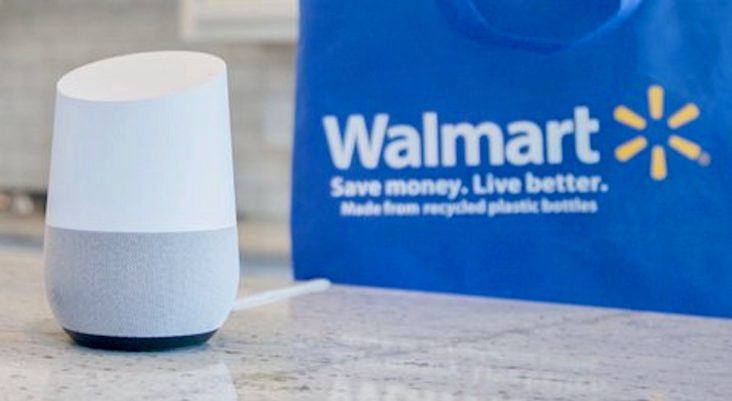Walmart’s test of voice commerce to be rolled out this spring
by March 7, 2019 5:42 pm 1,523 views

Voice commerce is one of the areas Walmart has tested for the past year with Google and is now working on its own application for online grocery. Walmart began testing the online grocery voice application several months ago with 100 VIP customers.
The retailer has refined the process and will release to the public in the next couple of months, according to Jason Shaffer, senior director of Walmart Digital Operations, who spoke to a group of Walmart suppliers on Thursday (March 7) at the Doing Business in Bentonville breakfast.
He said the customer gives their credentials and links with the online grocery data. Shaffer said it’s as simple as standing in his kitchen and saying “hey Google, talk to Walmart” which then activates the Walmart bot that can see his online grocery history. Shaffer said he tells Walmart to order cumin while standing in his kitchen and if that item is on his favored list it is selected first. The bot tells him the product brand and price it is picking. If the item is not on his favorite’s list then it will defer to what he bought last or the most commonly purchased brand and size of the product needed.
Shaffer told the group the Walmart voice bot does not skew toward the retailer’s private brands. He said the bot follows the same protocol for choosing the item starting with personal favorites, last purchased and then most commonly bought. He said the customer can approve or decline the item found by the bot. If the item is declined the bot moves to another option. The Walmart voice commerce system also allows users to check what is in the basket, store pickup hours, or check pickup or delivery times. The Walmart platform works with Google and other third-party apps and allows customers to build their basket.
Shaffer said Walmart has gained plenty of insights from the earlier work with Google and more recently with its own test that is designed to make shopping easier. Consumers who use Walmart pickup grocery will be notified by email when the service is turned on in their area.
Voice commerce is seen as the next frontier in retail and it’s not just smart speakers leading the transformation, it’s also smartphone usage which is now 77% of the general population. Jake Stanley, co-founder of Little Rock-based Vocool, said the retail market is ripe for disruption with the growth of voice commerce. He said smart speakers are just the tip of the iceberg as to how far voice commerce will grow.
“In a few years smart speakers will be ubiquitous. I can foresee retailers having smart shelves or some form of speaker integrated with the shelves that can interact with shoppers seeking more information about a particular product. This could be a great way for retailers to give consumers the product transparency they are craving. It could also be a way for suppliers to better tell their stories beyond the label to these consumers who want to know what a company stands for or against,” Stanley recently told Talk Business & Politics.
He said Walmart is smart to invest in voice commerce applications that help drive shopper loyalty overtime. Stanley said voice interfaces with iOT (Internet of Things) are going to be a bigger part of retail shopping experience in the not-so-distant future. He said retailers like Walmart have the ability to build shopping lists for consumers based on their recent purchases. He said just about any task that requires a click on the computer or smartphone can also be turned into a conversation with a voice assistant.
“I could tell my Walmart voice assistant to add everything I need to make Thai Pad to my shopping list. It would be up to the assistant to decide which items are needed,” Stanley said.
Stanley believes shopping assistants who use voice conversations are going to become more mainstream in the next two years, but that will likely just be a stepping stone to the next wave of innovation that is more seamless and event driven.
“Five years from now I think more smart refrigerators will be doing the ordering of butter, milk and other perishables as the quantities run low. This is likely to mean more product suppliers forging partnerships with the likes of Samsung and other appliance makers to ensure they are not lost in the fray,” Stanley added.
